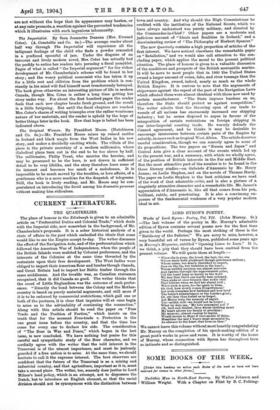The Imperialist. By Sara Jeannette Duncan (Mrs. Everard Cotes). (A.
Constable and Co. 6a.)—The average reader about half way through The Imperialist will experience all the indignant feelings of the child who finds a powder concealed in a proffered spoonful of jam. Under the disguise of an innocent and lively modern novel, Mrs. Cotes has actually had the perfidy to entice her readers into perusing a fiscal pamphlet. Pages of what is called "the Imperial argument" for the widest development of Mr. Chamberlain's scheme will be found in her story ; and the weary political economist who has taken it up for a little rest and oblivion from the problem which is con- stantly in his mind will find himself most treacherously betrayed. The book gives otherwise an interesting picture of life in modern Canada, though Mrs. Cotes is rather a long time getting her story under way. For about the first hundred pages the reader feels that each new chapter breaks fresh ground, and the result is a little fatiguing. But until the fiscal chapters are reached Mrs. Cotes's charm of writing triumphs over the rather wearisome nature of her materials, and the reader is upheld by the hope of better things later in the book. How that hope is belied has been indicated above.
The Original Woman. By Frankfort Moore. (Hutchinson and Co. 6s.)—Mr. Frankfort Moore mixes up ruined castles in Ireland and black magic from the West Indies in his new story, and makes a decidedly exciting whole. The villain of the piece is the private secretary of a modern millionaire, whose diabolical plans turn out in the end to be too clever by half. The millionaire, Philip Trent, who marries the heroine, and may be presumed to be the hero, is not drawn in sufficient detail to be very lifelike, and the story therefore loses some of its interest and becomes too much of a melodrama. It is impossible to be much moved by the troubles, or love affairs, of a gentleman who is a mere machine for the despatch of telegrams. Still, the book is lively reading, and Mr. Moore may be con- gratulated on introducing the Devil among his dramatis personae without making him ridiculous.










































 Previous page
Previous page